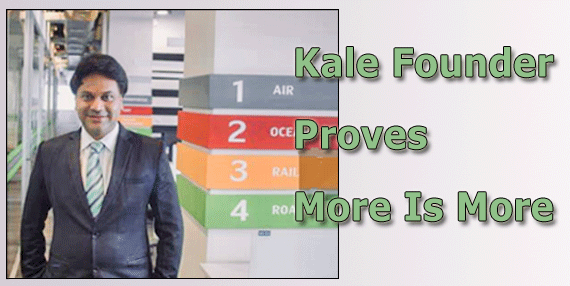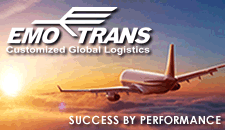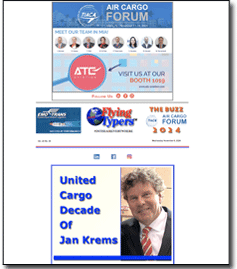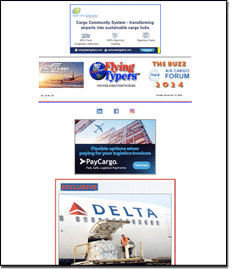 |
Some people like to say “less
is more.”
But a couple of years ago when I started
writing about Kale Logistics Solutions we were privileged to get to know,
albeit from a distance, Amar More, CEO of the company and a main driver
in dreaming up a better way to move cargo via the Kale Airport Cargo Community
System.
 Amar,
we have learned from our interactions and his writings, is fiercely smart. Amar,
we have learned from our interactions and his writings, is fiercely smart.
But we have also observed he is quite a
lovely, soft-spoken, kind, considerate and loyal individual who cherishes
family and life and is a very reliable business colleague.
What we publish now is a unique dialogue
with Amar More, whom we know to be an expert and a consummate businessman.
The level of the material we are presenting
and the answers Amar contributed will surely capture the attention of
the best-informed readers.
Although Amar’s last name is pronounced
in English with the “e” as a long “a”, we think
that the idiom “less is more” when talking to Amar is overtaken
by clear innovative inventive thinking:
More is more!
Keyword: Takeaway
What would you like shippers and logistics providers to know about
Kale Logistics in a paragraph or two of take away from the Miami air cargo
event this week.
Kale Logistics has a vision to facilitate
the global trade through technology. We have created next generation technology
platforms that facilitate digital interactions between different stakeholders
of the value chain to improve efficiency (by increasing the speed of cargo
movement), to improve sustainability (by reducing carbon emissions and
paper requirements), to improve visibility (by providing a single window
for tracking shipments) and to make supply chains more secure (by advance
exchange of data).
Our platforms are live and vibrant creating communities around the airports,
ports and inland ports across the world. We are digitizing 150+ airports
and ports across 40+ countries today trying to implement the best practices
and learnings from this global experience into our products which can
immensely benefit our customers.
Keyword: Cooperation vs.
Competition
Considering that your global experience is quite unique, what is your
view on how the cargo airlines and their freight forwarder partners’
role has changed in today’s world?
Excellent question. Everything about our
business in about collaboration. I mean we are facilitating digital collaboration
but the whole logistics industry is all about collaboration. If forwarders
and airlines don’t collaborate (co-operate) with each other, they
will never ever be able to deliver the goods on time. I am so happy to
see that a lot of things have changed in today’s world for the supply
chain partners. Initiatives such as e-AWB were once believed to have skewed
benefits across the stakeholders but now we see significant progress in
the adoption of such digitization initiatives. Online booking portals
once considered as a taboo in the air freight industry are slowly capturing
the markets. More and more airlines systems are getting connected to the
forwarder systems using APIs. So in spite of different and sometimes,
conflicting objectives, the community has realized the need for better
co-operation/collaboration to serve the end customers – BCOs. And
we at Kale are happy to be at the centre of facilitating this collaboration
through our technology platforms.
Keyword: Dealing With Obstacles.
Please name three great challenges in your daily business and how
you handle them? Was finding solutions in this regard also counting as
a learning curve and how?
My most spontaneous answer to your question
is 3 challenges are Mindset, Mindset and Mindset . Everything starts there.
The tools, the technologies, the solutions are not rocket science and
these are all there to be taken but the important thing is the mindset
to change. If one steps out of the daily grind and looks at what they
do everyday; one can come up with at least 2-3 new ideas to make the work
more efficient and in our industry more sustainable (i.e. identify the
copies of paper one doesn’t need to print to move a shipment) and
more transparent fashion.
The mindset change is effectuated by good
leadership and openness of the team to accept ideas that lead to a better
future. From our side, this requires a continual market education. We
are trying to change the industry and the way it handles/moves shipment
forever and for better and the change has to be ushered in, in a way that
will be easy to absorb by the industry. So breaking the task into small;
achievable targets; conducting proof of concepts to engender confidence
in the users; educating the leadership on the salutary benefits of the
change/digitization are some of the steps we are taking. Finally, the
change has to be driven by a neutral entity so that it is not being looked
at suspiciously by the rest; and here we believe the airports and ports
should be leading these changes as they are neutral and dominant players
in the supply chain and have everything to benefit from the effects of
digitization viz. job creation, sustainability, efficiency.
Keyword: Dealing With Failures
Kale Logistics has a reputation as hands-on problem solvers. Please
name a couple of major practical problems that Kale has solved or at least
lessened for clients.
Absolutely. I always love to quote the example
of one of the largest cargo airports in south Asia that we have worked
with who had a problem of processing more cargo in the same available
space. Only way this could be done if we increased the velocity of cargo
movement which in turn increases throughput of the existing facility.
We studied the factors that were slowing down the velocity, like trucks
arriving at the airports in bunches, paperwork making the truck and cargo
wait, handlers not knowing how much cargo was coming exactly when and
trucks not having cargo ready for delivery clogging the queues. We created
the platform where paperwork could be done in advance of trucks coming
to the airport through our cloud-based platforms and trucks came by appointment.
This indeed increased the throughput of the facility by 225% which means
the facility could process almost thrice the amount of cargo in the same
space. We received global recognition for this work.
Another one of my favorites is reducing
the container dwell time at a maritime port by 75% and reducing the time
for exporters to receive the tax refunds from 6 months to 3 days by creating
a community platform that allowed accurate exchange of information between
the tax authorities and the logistics movements and milestones.
Keyword: Brave New World
Can you go out on a limb and identify by challenge something you would
like to see changed in how the air cargo business is conducted?
I think for me the industry recognizes the
benefits of digitization but each is looking at the other’s face
to start the change. I would say that in our industry the airports need
to play a more active role in changing the status quo in cargo and getting
the community together on the journey of a digital future.
Keyword: Competition
Why ship Via Kale Logistic empowerment program? What are the advantages?
First and foremost a proven track record
for changing the status quo in the industry and this is not reflected
just in the awards we received for our work at neutral industry forums
like the United Nations but also by major universities covering our work
as pathbreaking and leading in improving the status of the industry. Just
the sheer breadth of digitization use cases that we have developed in
our community platforms / trade facilitation platforms sets us apart.
Our platforms have features for the exporters, importers, forwarders,
customs brokers, truckers, airlines, airports, handlers, customs, OGAs
/ PGAs, security agencies etc. this is more comprehensive than anything
else. The customer base of 150+ airports, ports and handlers across 40+
countries in facilitating trade speaks about the benefits our platform
continue to deliver.
I will classify benefits into efficiency
(increasing speed and throughput of cargo facilities); alleviating congestion,
reducing paperwork thereby cutting less trees and reducing carbon emissions
by reducing the wait times for trucks, enabling better planning through
advanced shipment information to the next stakeholder in the value chain;
enabling better and reliable visibility thereby reducing inventory costs,
giving the airports the ability to attract more cargo thereby creating
more jobs in the eco-system and finally giving more resiliency to supply
chains to handle pandemic or war situations better.
Keyword: Learning From Adversities
Has the pandemic experience had a lasting influence on the way your
business is handled?
We had an immense positive influence thanks
to the pandemic. Pandemic necessitated 3 things for the industry viz.
ability to work from anywhere, reduce the medium of transmission of virus
viz. paper and have social distancing viz. decongest airport/port facilities.
We incorporated most features in our platform to address the above and
make our customers more resilient to tackle pandemic-like situations.
For our internal work, we figured out that
a lot can be get done remotely. We had a record number of orders during
the pandemic and we executed most of those remotely. This gave us the
confidence that we can get work done remotely and that opened a new vista
for us to hire talent globally as well as from remote places. In fact,
to contribute to the society we hired a lot of talent from tier 2, tier
3 cities which created job opportunities in these places.
Keyword: Bigger And Bigger
Data?
What is your view of advanced analytics as leveraging data techniques
like machine learning (AI), deep learning (as a subset of machine learning),
and does agile software development emerge increasingly important in your
work?
Absolutely. I will first address the question
on agile development. It is the only way for us to move forward. We have
re-aligned our organization to the agile software development methodology
and we already see the results of the same.
On Machine Learning and AI it is absolutely
important not just to us, but for our customers as well. So today in our
truck traffic management module we have the components of AI; our pioneering
.pdf to EDI service has machine learning technology for intelligent data
capture. We are doing AI-based chatbots for our customers as well as our
internal stakeholders. As Kale we have an internal AI portal called KAITE
that our internal teams use across functions such as development, legal,
HR, Sales etc.
We firmly believe Machine Learning and AI
will have a significant impact on our future as well as on our customers’
future as well.
GDA/MLS |




 Vol.
23 No. 44
Vol.
23 No. 44